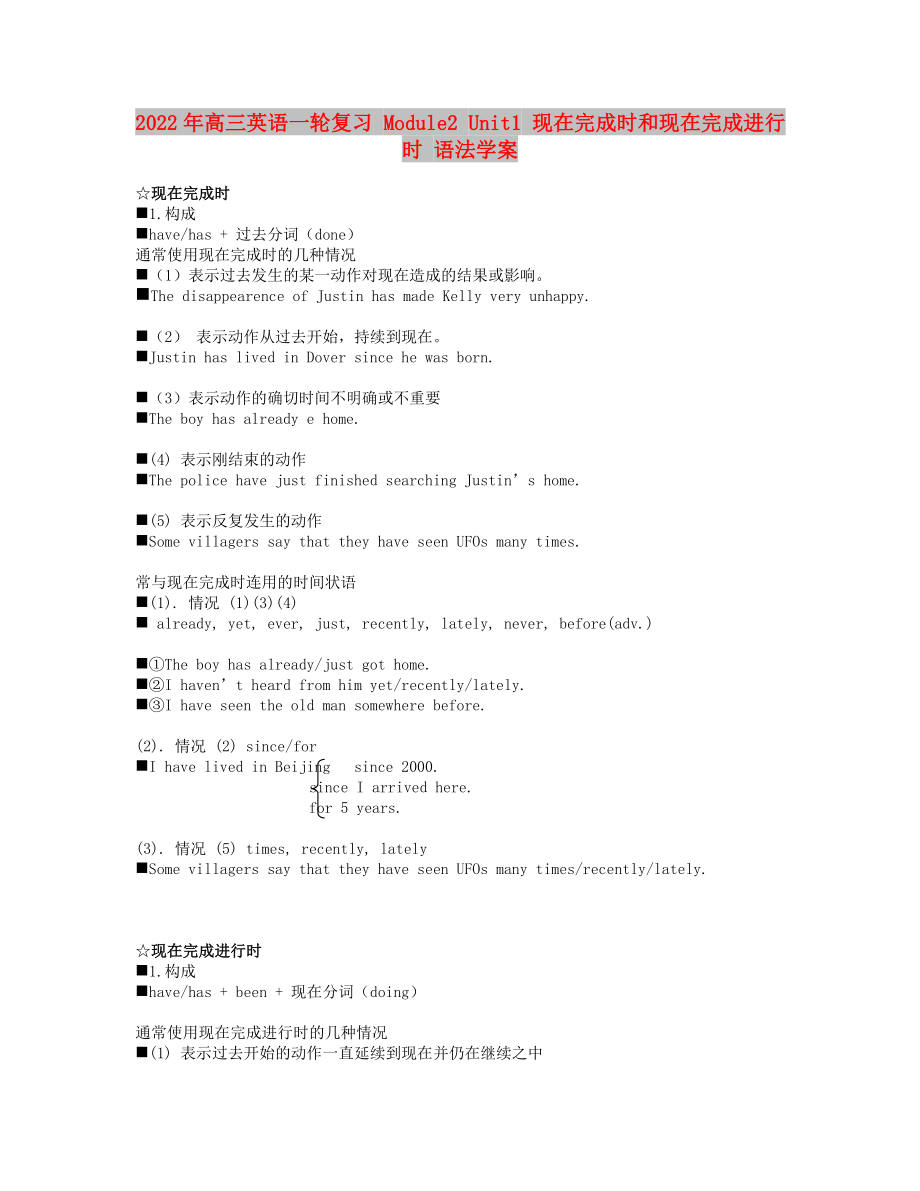《2022年高三英語一輪復(fù)習(xí) Module2 Unit1 現(xiàn)在完成時(shí)和現(xiàn)在完成進(jìn)行時(shí) 語法學(xué)案》由會(huì)員分享,可在線閱讀��,更多相關(guān)《2022年高三英語一輪復(fù)習(xí) Module2 Unit1 現(xiàn)在完成時(shí)和現(xiàn)在完成進(jìn)行時(shí) 語法學(xué)案(2頁珍藏版)》請(qǐng)?jiān)谘b配圖網(wǎng)上搜索�。
1、2022年高三英語一輪復(fù)習(xí) Module2 Unit1 現(xiàn)在完成時(shí)和現(xiàn)在完成進(jìn)行時(shí) 語法學(xué)案
☆現(xiàn)在完成時(shí)
n 1.構(gòu)成
n have/has + 過去分詞(done)
通常使用現(xiàn)在完成時(shí)的幾種情況
n (1)表示過去發(fā)生的某一動(dòng)作對(duì)現(xiàn)在造成的結(jié)果或影響��。
n The disappearence of Justin has made Kelly very unhappy.
n (2) 表示動(dòng)作從過去開始�����,持續(xù)到現(xiàn)在�����。
n Justin has lived in Dover since he was born.
n (3)表示動(dòng)作的確切時(shí)間不明確或不重要
n Th
2��、e boy has already e home.
n (4) 表示剛結(jié)束的動(dòng)作
n The police have just finished searching Justin’s home.
n (5) 表示反復(fù)發(fā)生的動(dòng)作
n Some villagers say that they have seen UFOs many times.
常與現(xiàn)在完成時(shí)連用的時(shí)間狀語
n (1). 情況 (1)(3)(4)
n already, yet, ever, just, recently, lately, never, before(adv.)
n ①The boy
3�、 has already/just got home.
n ②I haven’t heard from him yet/recently/lately.
n ③I have seen the old man somewhere before.
(2). 情況 (2) since/for
n I have lived in Beijing since 2000.
since I arrived here.
for 5 years.
(3). 情況 (5) times, recentl
4���、y, lately
n Some villagers say that they have seen UFOs many times/recently/lately.
☆現(xiàn)在完成進(jìn)行時(shí)
n 1.構(gòu)成
n have/has + been + 現(xiàn)在分詞(doing)
通常使用現(xiàn)在完成進(jìn)行時(shí)的幾種情況
n (1) 表示過去開始的動(dòng)作一直延續(xù)到現(xiàn)在并仍在繼續(xù)之中
n She has been talking to me since she saw me.
n (2) 表示過去開始的動(dòng)作剛結(jié)束并在某種情況下與現(xiàn)在有關(guān)聯(lián)
n —Sorry I am late. Hav
5�����、e you been waiting long?
n —Yes. I have been waiting for an hour.
☆現(xiàn)在完成時(shí)與現(xiàn)在完成進(jìn)行時(shí)的區(qū)別
n 1.現(xiàn)在完成時(shí)與現(xiàn)在完成進(jìn)行時(shí)都表示動(dòng)作從過去開始�,但現(xiàn)在完成時(shí)表示事件或動(dòng)作剛結(jié)束,而現(xiàn)在完成進(jìn)行時(shí)則強(qiáng)調(diào)動(dòng)作仍在繼續(xù)
n I have read a book.
n I have been reading a book.
n 2.現(xiàn)在完成時(shí)可表示反復(fù)發(fā)生的動(dòng)作���,提問時(shí)用how many times��。而現(xiàn)在完成進(jìn)行時(shí)則表示持續(xù)的�、不間斷的動(dòng)作�,提問時(shí)用how long
n I have vis
6、ited Egypt twice this month.
n How many times have you visited Egypt?
n I have been visiting Egypt for two months.
n How long have you visited Egypt?
n 3.現(xiàn)在完成時(shí)可以用持續(xù)性動(dòng)詞和短暫性動(dòng)詞作謂語�,
而現(xiàn)在完成進(jìn)行時(shí)則只能用持續(xù)性動(dòng)詞。
I have done my homework.
I have finished my homework.
I have been doing my homework.
I have been finishing my homework
簡(jiǎn)而言之:
n ★短暫性動(dòng)詞:
不可以用于現(xiàn)在完成進(jìn)行時(shí)�,
只能用于現(xiàn)在完成時(shí)
n 4.現(xiàn)在完成時(shí)的句子中可以用像never、yet��、already和ever等作時(shí)間狀語����,而現(xiàn)在完成進(jìn)行時(shí)的句子中則不可以用這樣的詞
n I have already been to Beijing.
n I have never been to Beijing.
n I haven’t been to Beijing yet.
 2022年高三英語一輪復(fù)習(xí) Module2 Unit1 現(xiàn)在完成時(shí)和現(xiàn)在完成進(jìn)行時(shí) 語法學(xué)案
2022年高三英語一輪復(fù)習(xí) Module2 Unit1 現(xiàn)在完成時(shí)和現(xiàn)在完成進(jìn)行時(shí) 語法學(xué)案

